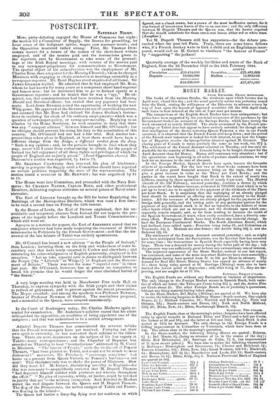POSTSCRIPT.
SATURDAY NIGHT.
More party-debating engaged the House of Commons last night : the motion for a Committee of Supply, the licence for grumbling, let loose some of the indignant spirits, magno cum murmure montis ; and the Opposition mustered rather strong. First, Mr. Thomas Don- COWIE moved for a return of the names of the short-hand writers employed, and of the monies paid and the instructions given to the reporters sent by Government to take notes of the proceed- ings at the Irish Repeal meetings; with returns of the monies paid to any newspaper-proprietors for communications to Government. The special object of his animadversion was the employment of Mr. Charles Ross, then a reporter for eilforning Chronicle; whom he charged Ministers with engaging to obtain admission at meetings ostensibly as a newspaper-reporter. Mr. Bond Hughes stood acquitted of all blame. Sir JAMES GRAHAM replied. He admitted that he had employed Mr. Ross, whom he had known for many years as a competent short-band reporter and honest man ; but he instructed him to go to Ireland openly as a Government reporter ; and he denied that he was a "spy." He ad- mitted, too, that communications had been received from the Morning Herald and Standard offices ; but denied that any payment had been made. Lord JOHN RUSSELL seized the opportunity of working the new Whig game. He approved of the Government use of accredited reporters, and assumed that Mr. Ross had violated Sir James Graham's instruc- tions in retaining the cloak of his ordinary employment—which was a question of newspaper-policy, or newspaper-morality. Replying to an allusion by the Home Secretary, he took occasion to deny that there was any "compact alliance" between himself and Mr. O'Connell ; but no obloquy should prevent his doing his duty to the constitution of this country. Mr. O'Connell had not had a fair trial. Had similar law- proceedings taken place in England, at least there would have been a different charge from the Judge, a thiferent verdict from the Jury. "Such is my opinion ; and, be the persons brought to trial whom they may, never will I cease from endeavouring to obtain for the people of Ireland the full enjoyment of all those rights and privileges of %Meta the people of England are sojustly proud." (Loud Opposition cheers.) Mr. Duncombe's motion was negatived, by 144 to 73.
Mr. SHARMAN CRAWFORD then renewed his plan of hindrance ; moving to postpone the Supply until a Committee should have reported on certain petitions respecting the state of the representation. The motion found a seconder in Mr. BLE:saTT; but was negatived by 91 to 15.
The House went into Committee, and proceeded with the Navy Esti- mates; Sir CHARLES NAPIER, Captain Rous, and other professional Members, delivering copious strictures on several points of Naval admi- nistration.
The Earl of Lit:corm brought up the Bill for better Regulating the Buildings of the Metropolitan Districts, which was read a first time; to be read a second time on Friday the 15th instant.
In the House of Lords, the Earl of DEVON explained, that his un- avoidable and temporary absence from Ireland did not impede the pro- gress of the inquiry before the Landlord.and Tenant Commissioners ; which still went on.
Apropos to a motion for papers, the Earl of ABERDEEN stated that no complaint whatever had been made respecting the treatment of British missionaries in Polynesia by the French Government ; and that the dis- avowal of the late seizure of Tahiti was entirely spontaneous.


























 Previous page
Previous page